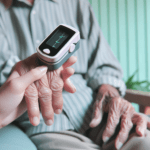
Taking care of the respiratory health of our elderly loved ones is a responsibility that caregivers hold dear. As we age, our respiratory system becomes more vulnerable, making it essential to provide proper support and care. In this article, we will explore various strategies and practices that can help caregivers ensure the respiratory well-being of their elderly loved ones. From promoting a smoke-free environment to encouraging regular exercise and maintaining a clean living space, we will discuss valuable tips that can make a significant difference in the lives of our beloved seniors.

Maintain a clean and allergen-free environment
Keeping the house clean and dust-free is important for maintaining good respiratory health for your elderly loved ones. Dust can trigger allergies and respiratory issues, so it is crucial to regularly dust and clean the house. Vacuuming and mopping the floors, wiping down surfaces, and regularly changing bedsheets can help reduce the presence of allergens in the home. It is also important to regularly clean ventilation systems, filters, and air conditioning units to ensure that the air circulating in the house is clean and free from allergens.
In addition to cleaning the house, it is crucial to remove and avoid triggers that can worsen respiratory health. Pets, for example, may cause allergies or trigger asthma attacks in some individuals. If your loved one has respiratory issues, it may be necessary to find a new home for their pet or limit contact with them. Similarly, smoking should be strictly avoided in the house, as it can significantly worsen respiratory symptoms. Encourage family members and visitors to smoke outside, away from the elderly person.
Using air purifiers and humidifiers can also help create a clean and allergen-free environment. Air purifiers can filter out particles such as dust, pollen, and pet dander, improving the air quality indoors. Humidifiers, on the other hand, can add moisture to the air, which can be beneficial for individuals with respiratory conditions like dry cough or congestion.
Encourage regular physical activity
Regular physical activity is essential for maintaining good overall health, including respiratory health. Promoting light exercise and stretching can help improve lung capacity and strengthen respiratory muscles. Simple activities like stretching exercises, gentle yoga, or tai chi can be beneficial for your loved one. Even short walks around the neighborhood or in a nearby park can offer respiratory benefits.
It is important to consult a healthcare professional for specific exercise recommendations tailored to your loved one’s capabilities and health condition. They can provide guidance on the most appropriate exercises and the intensity that is safe for your loved one.

Ensure proper nutrition
Proper nutrition plays a crucial role in supporting respiratory health. Offering a balanced diet that is rich in fruits and vegetables can provide essential vitamins and antioxidants that support lung function. Fruits and vegetables such as oranges, berries, spinach, and broccoli are particularly beneficial for respiratory health due to their high vitamin C content.
Adequate hydration is also important for maintaining healthy respiratory function. Encourage your loved one to drink plenty of water throughout the day to keep their airways moisturized. Limiting foods that can contribute to respiratory issues, such as dairy products or processed foods high in salt and trans fats, can also help improve respiratory health.
Manage medication and treatments
If your loved one is on medication or treatments for their respiratory condition, it is crucial to help them with medication adherence. This includes ensuring they take their medications as prescribed, organizing and keeping track of their medications, and reminding them when it is time to take them. You can also help them with any necessary techniques for using inhalers or nebulizers, ensuring they are using them correctly.
Scheduling and accompanying your loved one to medical appointments is also important. Regular check-ups with healthcare professionals can help monitor and manage their respiratory condition effectively. Additionally, it is important to communicate any concerns or changes in symptoms to the healthcare provider to ensure appropriate adjustments to their treatment plan.

Promote good respiratory hygiene
Promoting good respiratory hygiene is vital for preventing respiratory infections and maintaining overall respiratory health. Encourage frequent handwashing with soap and water, especially before meals or after coming into contact with potentially contaminated surfaces. Proper cough and sneeze etiquette, such as covering the mouth and nose with a tissue or the elbow, can help prevent the spread of respiratory droplets.
In certain situations, providing respiratory aids like face masks or supplemental oxygen may be necessary to support your loved one’s respiratory health. Consult with healthcare professionals for guidance on the appropriate use of these aids and any necessary adjustments based on their specific condition.
Create a smoke-free environment
Avoiding smoking in the house or around your elderly loved one is crucial for their respiratory health. Secondhand smoke can worsen respiratory symptoms and increase the risk of developing respiratory infections and diseases. If your loved one is a smoker, it is important to encourage them to quit smoking and provide support throughout the process. Quitting smoking can greatly improve their respiratory health and overall well-being.
Installing smoke detectors in the house and ensuring they are functional is also important to alert you and your loved one to potential fire hazards or smoke. Regularly checking the batteries and testing the smoke detectors can provide peace of mind and increased safety.
Monitor respiratory symptoms
It is essential to pay attention to any changes in your loved one’s breathing patterns. Observe for signs of respiratory distress, such as shortness of breath, wheezing, or difficulty breathing. Be attentive to any coughing or wheezing that persists or worsens over time. Keeping a record of their symptoms and sharing it with healthcare providers during medical appointments can assist in accurate diagnosis and effective management of their respiratory condition.
Ensure a comfortable sleep environment
A comfortable sleep environment is crucial for maintaining respiratory health. Ensure that the bedroom is clean, well-ventilated, and free from allergens that can trigger respiratory issues. Regularly dusting and vacuuming the bedroom, using hypoallergenic bedding materials, and washing bedding in hot water can help create a conducive sleep environment.
In some cases, elevating the head of the bed slightly can improve breathing and reduce congestion during sleep. This can be done by using additional pillows or investing in an adjustable bed if necessary.
Encourage stress management
Stress can have a negative impact on respiratory health, so it is important to promote stress management techniques for your loved one. Encourage relaxation techniques such as deep breathing exercises, meditation, or gentle yoga. Engaging in enjoyable activities, such as listening to music, reading, or spending time with loved ones, can help reduce stress levels and promote overall well-being.
Offer emotional support and encourage open communication with your loved one. Being a caregiver can be demanding, so it is important to take care of your own well-being as well. Seeking support from caregiver support groups or counseling services can provide you with additional resources and guidance.
Seek professional advice and support
Consulting with healthcare professionals is essential for personalized guidance in managing your loved one’s respiratory health. They can provide specific recommendations based on their medical history, symptoms, and overall health condition. Regular appointments can help monitor their respiratory condition effectively and make any necessary adjustments to their treatment plan.
Consider joining a caregiver support group to connect with other individuals who are in similar caregiving roles. These support groups can provide valuable insights, tips, and emotional support. Staying informed about respiratory conditions and available resources can also empower you to provide the best care possible for your loved one.









